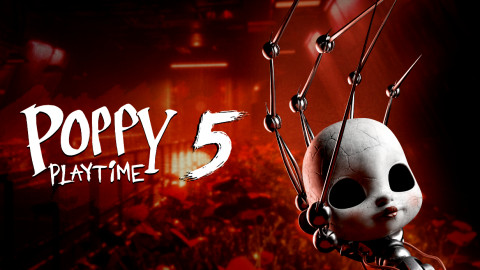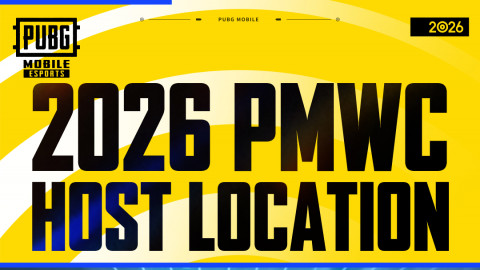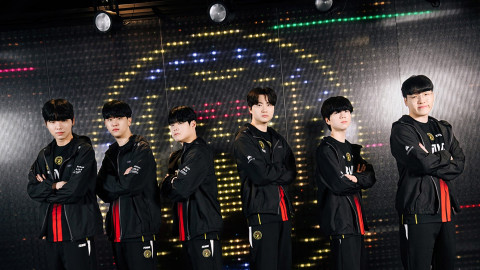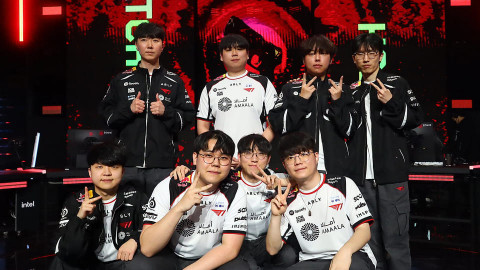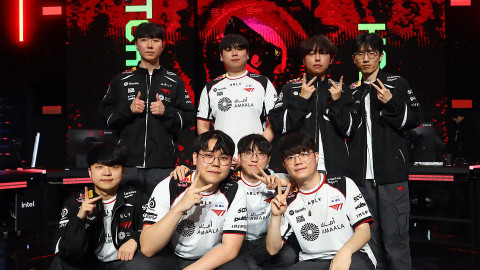
Maurice "Amazing" Stückenschneider has recently addressed the verbal and emotional abused professional players go through when connecting with fans on the internet. During the sixth week of the League of Legends European Championship, Lara Lunardi got to further discuss the subject with Misfits' coach.
Recently on Twitter, you openly discussed mental health and how players are treated and perceived by the fanbase. I wanted to ask you what made you do this tweet in the first place?
There wasn't a specific reason for it. It's just an overall observation, I guess. Recently, it's been all about addressing certain things that happen off the radar, so I felt now it was the right time to address it, especially after I've spent some time being a coach, so I've seen the other side too. It just felt like the right time to do it.
Let's go back to the beginning of your career. When did you realize that the road ahead of you would be different than that of the usual person when it comes to dealing with criticism online or dealing with public pressure in general?
I think I was never someone who liked social media. Even when I was starting my career, I didn't use social media until 2014, when I was forced to by the organizations I was working with — Copenhagen Wolves and TSM, especially — I had to use my Twitter. I think the first time I felt there was some kind of backlash against me as a person was on TSM, mainly due to some insider at the time who had some clout. This was further established by esports journalists such as MonteCristo and Thorin — which I'm actually completely fine with these days — but at the time they were really popular with the Summoning Insight show and a lot of people took whatever they said as gospel.
Especially me as a new player in NA, as a player who was not performing and filling the shoes of the other one, was basically an easy target at the time. I definitely felt a lot of the criticism and due to the fact that I had to establish a social media presence, while also having to face criticism, was pretty new to me so I couldn't quite put it into my frame of mind, I guess, into what I usually focus on and face on a daily basis. That whole thing was completely into me.
It almost affected every single thought or act every single day, because I had to take into account other things that I didn't take into account beforehand and it was slightly overwhelming to me, especially criticism coming in to that level of harshness.
What did that do to you?
What it did to me was make me a bit more cynical about some things. I tried to distance myself by being a bit more cynical, a bit more aggressive maybe even. Sometimes I was a bit more vengeful instead of being an enjoyable person, which I think I usually was or still am to a certain extent, someone that can take some time off esports, get their mind straight, and enjoy being in the competition instead of seeing it as something where I had to continuously prove myself.
That's what it did to me. It helped me establish that frame of mind: I have all these people going after me and are negative towards me and I need to prove them wrong every single day. That defined me for a long, long time and I think I only really dropped it in 2016 when I finally felt I was the best jungle in the West, as I was also in the All-Star in 2015. I felt I didn't have to care about it anymore, that I've finally proved everyone wrong, only to drop it once more once I encountered some of the issues with Origen and later on with Fnatic, when suddenly I had to once again prove who I was and how good I am. The critics were loud and clear again, which always happens when I'm down.
That made me a vengeful person, an angry person, honestly a despicable human to a certain extent. That's not something I inspire to be at all. And I think online criticism, you don't quite deal with it as if it were strangers, but actually people speaking to you. When you see someone's Twitter profile popping up and he's criticizing you, you're not like, "Oh, this guy is just a Twitter profile". Maybe you do it in the beginning. Maybe you do it once, twice, three times, ten times. But if people slide into your DMs and are like, "You're terrible, you're disgusting, kill yourself"... at this point you can't deal with it anymore in a way that it's a stranger talking to you. It becomes really personal and that's how it affects you.
Do you think these people talking to you are taking into consideration what they're saying? Why do you think they go out of their way to attack you? To me, it feels like they take what players do a lot more seriously than they should.
I think the anonymity of the attack allows people to be a lot more disgusting and despicable than they usually are. I do think they take actions of pro players more seriously because — and that's going to sound kind of cocky but it's also probably the truth — a lot of people think they can be in the place of the pro player, especially up and coming ones. They think the game is so easy, thus every mistake a pro player makes is something they could've avoided.
So, their superiority complex makes them assume they're better than you. That in itself makes them criticize you a lot more harshly because in their eyes they could've done better.
Furthermore, there's a lot of jealousy. And there's also — and that's maybe the other side — vocal minority on social media, they have to deal with certain issues themselves and now they feel like they have a vessel to let off some steam. It's like a football fan screaming at the TV being like, "Oh, you missed that shot, why are you so bad?" But they [esports fans] take it to another level because of social media where there's basically no barrier between them anymore and they take it out with the people themselves. It's kind of like a hooligan at a football game.

And now it seems to me you have a different mindset about the whole situation. When do you think was the tipping point when you started addressing these matters on social media, started calling fans out, and advocating for players instead?
Because I see what it does with my players, with Doss. Doss has been someone that has been heavily criticized ever since we decided to change him out for denyk, even though that decision wasn't on him. If they want to come for someone, they can come for me or Jandro. When I see this guy avoiding social media or try not to read some comments, it puts fear in my soul because I've been in that situation. I think the disgusting habits that some people have of attacking 19, 17, 18, 20-year-old people that have just been released from home to a certain extent and have been opened to the world by moving to another country, by getting to play the game they've loved for so many years — and now suddenly they put it in their mind that they might not enjoy it as much.
That actually makes me scared. It makes me sad, too, because this shouldn't happen. It shouldn't be that the love for the game, especially for a game like League of Legends, is driven away because of social media.
That's what's happening a lot of the time to a lot of people. That's why I often see certain people giving up on esports, because what's the point if everything you do is being criticized to the point that people tell you to kill yourself? What is this?
When I see it with my players, it makes me sad and when I see it with other teams, I just want to address it, because I think it's more than important that we as pro players, coaches, staff take a stance against it. We allow ourselves to be vulnerable because we hang around on social media more often, we are not rich enough to basically hire someone to handle our social media. That's not gonna happen, especially rookies, they're not going to do that. They will be interacting on a very personal level with the fans.
That's also used by a lot of people in a well-meaning manner too, so it's not just negative. But I think it's a rule in psychology, the 1:10 rule — for every one negative comment there need to be ten good comments, and ten good things happen to you. And in times of doubt, when you're not performing well, that ratio is not 1:10, that ratio is 3:5, or 1:1.
What do you think organizations need to do to protect their players?
One thing would be to allow people to have their social media run by another person, kind of like how Misfits do it. But second, it's just protecting the player. No action is the worst thing you can do. Let's take any popular streamer, who has an active Twitch community. When they say "This guy is terrible," then suddenly it becomes gospel. And when it does, then they attack people who might not have the same kind of active following. You need to push against it, shelter them a little bit.
We don't want to make a world where no one can be hurt, but when someone is, you need to pick them back up, help them when they are vulnerable. That's what we have to establish. That's what counts.

What are you doing as a coach to assist your players? Is it passing down your knowledge that you've gained through all these years?
Yes, of course I do that. I kind of do what I wish people would've done for me as a player. That's what I'm trying to achieve. I want to do better than what people did for me, I want to fill that gap to a certain extent. As a player, I wanted someone to step up for me. Every time someone is under heavy criticism from my team, I have been really adamant about helping them out in some way.
Back when you started, esports psychologists weren't as frequently seen and teams either didn't have the funding or didn't have the knowledge on how to make a safe environment for players. What do you think this more frequent presence of psychologists is doing to the players and the scene in general?
It can go both ways. It entirely depends on the person that is hired. Some esports psychologists that I've worked with are more on the performance side of things but are not addressing the mental side, and vice versa.
For me as a person, maybe because I'm slightly more vulnerable because of how I act, I guess — because I am a very open person in terms of what I broadcast to the world — I can't take care of some of the performance issues that I have, but I can take care of the psychological issues that I have. Certain things just past me and I don't realize it. I am happy that the psychology side of things has especially picked up. When I was a player, especially in later years when I knew I had to perform and there were so many people doubting me, I was really happy I had two sports psychologists that I worked with and were really helpful to me. I talked to them about stuff I couldn't talk to my teammates or to the staff about because it was mostly psychological issues that I was dealing with throughout my career.
Opening up that avenue is so important for so many people because being vulnerable, showing vulnerability is the scariest to do. But when you're OK with being vulnerable — and I'm not saying I'm like a God among men or anything — it allows you to be strong in every single moment because at that point you open yourself to anything that can happen to you and then you build yourself up stronger from that.
That whole action of the mind that I've been trying to pursue throughout my career and even my life has been something people have taken advantage of, but oftentimes it's often granted me connections to people that have allowed me to transcend normal human interactions, has allowed me to build friendships and teammate relationships that on a normal scale I maybe wouldn't have been able to achieve.
I am not the only one, but I feel a lot of players these days are scared of being open, of being vulnerable. I don't think that should be the case.
Looking for more League of Legends Esports? We got it.
Sort by:
Comments :0



